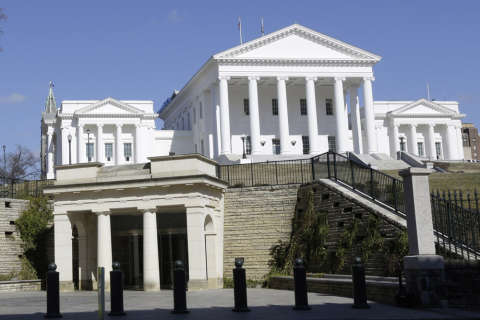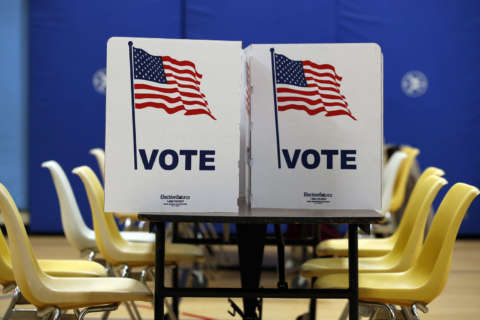WASHINGTON – Even as questions still surround two seats in the House of Delegates, Virginia’s General Assembly convenes at noon Wednesday, with members set to dive headlong into a 60-day sprint on issues ranging from Medicaid expansion and gun violence to Metro and Interstate 66 tolls.
Democrats are waiting on the Fourth Circuit to weigh in on an appeal seeking to keep Bob Thomas from being seated, where some 147 people in the Fredericksburg area voted in the wrong races. Thomas won in the 28th District by 73 votes. In the 94th District race in Newport News, Democrat Shelly Simonds has not said how or whether she will challenge her loss in a random drawing to Republican Del. David Yancey.
With Yancey and Thomas, Republicans have a 51-49 edge in the House of Delegates that will allow them to elect Del. Kirk Cox of Colonial Heights as speaker.
Republicans hold a 21-19 edge in the state senate.
Gov. Terry McAuliffe will deliver his final State of the Commonwealth Address Wednesday night. Governor-elect Ralph Northam, a Democrat, is to be sworn in on the capitol steps shortly after noon Saturday.
While the biggest focus of the session is the two-year state budget plan, a series of other bills already filed could have large and small impacts.
Transportation
Many of the most important pieces of transportation-related legislation are about money.
- New dedicated funding proposed for Metro through some higher Northern Virginia taxes if Maryland and D.C. agree to pay their share and to temporarily shrink the Metro Board. The tax increases proposed include setting a minimum on the regional gas tax, increasing a real estate transfer tax, and raising the Northern Virginia hotel tax.
“It looks good; that’s probably going to happen. There is some momentum, but we’ve been here before and it’s not happened, so I don’t think we should take anything for granted,” Virginia transportation secretary Aubrey Layne said Tuesday. He is shifting to finance secretary under incoming Gov. Ralph Northam.
The reform board, which would have no additional powers beyond the current board, is “key to Virginia” providing the additional money, Layne said.
- Bills to revise or remove new tolls on I-66 inside the Beltway, which transportation officials warn would limit the benefits of carpooling or transit and require the state to pay back money to the companies building toll lanes outside the Beltway.
- A bill that would require an additional lane in each direction on I-95 between Spotsylvania County and the Capital Beltway (the bill does not provide additional funding for the widening).
- A bill that would push Virginia to use LEDs rather than traditional lighting systems for outdoor lighting, unless it is found not to be cost effective on highways.
- Several bills aim to change how money is allocated to transportation projects ranked in the state’s SmartScale system. Bills suggest accounting for total project costs, the number of people who would be moved or delayed or travel time reliability, expanding consideration of the projects outside of weekday rush hours to include weekends and other times, and eliminating some bicycle or pedestrian projects from certain funding streams.
- A bill that would require Virginia to conduct another study of purchasing the Dulles Greenway from its private owners. Past studies have found tolls would not change if the road were purchased by the state since the money would still be needed to cover debt payments.
- A proposed constitutional amendment that could go to voters this fall providing for a “transportation lockbox” that restricts transportation money to transportation projects.
Another transportation-related bill would allow more local governments to rename any highway in their jurisdictions named before 1965 (e.g. Jefferson Davis Highway), as long as the locality pays the costs of any new signs.
Among new efforts to prevent or punish distracted driving, a bill would ban drivers from having an animal on their lap behind the wheel. That bill would also ban any use of a handheld device while driving, extending Virginia’s existing prohibition on checking emails or texting.
Some other notable bills
Republican Del. Michael Webert filed a bill that would eliminate the crime of profanely swearing or cursing in public, currently punishable as a Class 4 misdemeanor. This will be Webert’s third try at getting the legislation passed. In the past two years, his bill has died in committee.
Alexandria Democratic Del. Mark Levine wants to repeal “the crime of fornication, i.e., voluntary sexual intercourse by an unmarried person.” Levine told The Virginian-Pilot that the fornication law is “obviously outdated, it’s silly, and it’s unconstitutional.” It’s important to clean up the state code and get archaic rules off the books, he said.
A bill from Del. Terry Kilgore, the GOP leader of the House Commerce and Labor Committee, would remove several Sunday-specific limitations on hunting — among them, a ban on hunting raccoons. Current law permits the hunting or killing of raccoons on Sunday only until 2 a.m. The measure also removes the prohibition on hunting deer or bear with a gun, firearm, or other weapon with the assistance of dogs on Sundays, with certain exceptions.
A bill from Fairfax Democratic Del. Eileen Filler-Corn would officially designate the red salamander as the state salamander of Virginia. The salamander would join other animals such as the dog, fish, bat, bird and snake with official state designations. Among other things, Virginia has two official state songs and an official beverage – milk.
The Associated Press contributed to this report.






